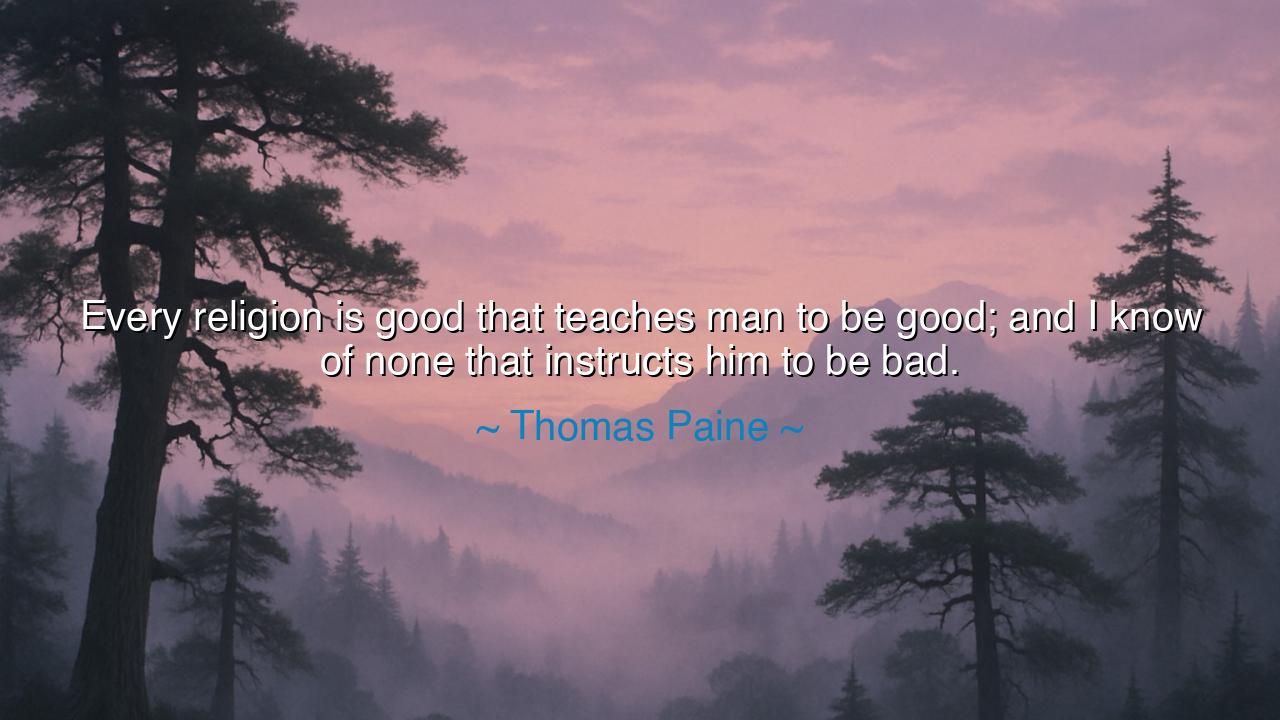
Every religion is good that teaches man to be good; and I know of
Every religion is good that teaches man to be good; and I know of none that instructs him to be bad.






Hear now, O seekers of truth, the profound words of Thomas Paine: "Every religion is good that teaches man to be good; and I know of none that instructs him to be bad." These words, simple in their elegance, strike at the heart of what it means to live a moral life, to walk in the light of virtue, and to seek a higher truth. Paine, a man of great intellect and unflinching courage, understood that the essence of all religious teachings, no matter how diverse or varied, is rooted in the same principle—the call for goodness, kindness, and the pursuit of moral integrity. Religion, in its truest form, is not a mere ritual to be observed, but a path that leads the soul to rise above the base instincts of the self and to connect with the divine within and around us.
In ancient times, the great philosophers of both the East and the West spoke of the higher self, the divine nature of humanity, and the way in which one should live in accordance with these ideals. Confucius, in his teachings, emphasized that the cultivation of virtue was the highest calling of man. He believed that a man could bring harmony to his society not through power or wealth, but through the goodness of his character. The Golden Rule—to treat others as you wish to be treated—was not just a guideline for personal conduct but a call to build a world founded on compassion and respect. Similarly, in the ancient Greek tradition, Socrates understood that to live a virtuous life was to live in pursuit of truth and justice, virtues that could elevate the soul and bring balance to society. Both philosophers, though from different traditions, understood that goodness was the highest principle that any religion or philosophy could offer.
The same truth rings clear in the teachings of Buddha, who did not just speak of detachment from worldly desires, but also of living a life of compassion, mercy, and wisdom. The Eightfold Path, which he laid out for his followers, was not a mystical doctrine reserved for the few, but a practical guide to living with kindness, honesty, and mindfulness. Buddhism, like Christianity, calls its followers to rise above the selfishness of the individual self and to reach out in service to others, teaching that a truly good life is one in which love and compassion reign supreme.
In the same vein, the teachings of Jesus Christ echoed throughout history, offering a profound vision of what it means to be good in the face of suffering, evil, and hardship. Jesus’ call to “love your neighbor as yourself” is not just a religious command, but a profound ethical guideline that has transcended centuries. The life of Jesus was a testament to the idea that goodness is not a passive state but an active force that transforms the world. He healed the sick, fed the hungry, and forgave those who wronged him, showing that true religion is not merely about belief, but about action. His teachings, like those of Confucius and Buddha, invite us to live with integrity and to make the world a better place through our deeds.
Yet, throughout history, religion has often been distorted, used as a means of control, domination, and division. Paine understood this all too well. In his time, religion was often manipulated by the powerful to suppress the masses. The churches, both in Europe and in America, were seen not only as spiritual institutions but as political entities, enforcing a vision of morality that suited the ruling classes. Paine was not against religion itself, but against the ways in which it had been twisted to suppress freedom and justice. His call was for a religion that uplifted the human spirit, a religion that promoted virtue, freedom, and equality, and above all, goodness.
The lesson in Paine’s words is clear: religion, in its purest form, is meant to guide us toward being good, not just in belief, but in action. It calls us to live a life that reflects the divine within us, and in doing so, we bring light and goodness into the world. It does not matter the name of the religion, the rituals, or the doctrines—what matters is the effect it has on the soul and on the world around us. Does it make us better people? Does it make us more compassionate, just, and kind? Paine reminds us that true religion teaches us to be good, and if it does not, it is a distortion of its original purpose.
So, O seekers, in your own life, remember that the true measure of any faith lies not in how pious or devout one appears, but in how good one lives. Let your actions be the mirror of your beliefs. Live with integrity, and let your faith lead you to act with compassion, to help those in need, and to strive for justice and equality in the world. Let your goodness shine forth in every interaction, for in this, you will embody the true spirit of religion—the spirit that transcends all barriers and leads humanity toward a future of peace and harmony.






AAdministratorAdministrator
Welcome, honored guests. Please leave a comment, we will respond soon